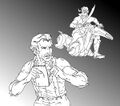Template:Selected anniversaries/August 26: Difference between revisions
No edit summary |
No edit summary |
||
| Line 31: | Line 31: | ||
||1882: James Franck born ... physicist and academic, Nobel Prize laureate. | ||1882: James Franck born ... physicist and academic, Nobel Prize laureate. | ||
||1886: Jerome C. Hunsaker born ... aeronautical engineer who made major innovations in the design of aircraft and lighter-than-air ships, seaplanes, and carrier-based aircraft. His career had spanned the entire existence of the aerospace industry, from the very beginnings of aeronautics to exploration of the solar system. He received his master's degree in naval architecture from M.I.T. in 1912. At about the same time seeing a flight by Bleriot around Boston harbour attracted him to the fledgling field of aeronautics. By 1916, he became MIT's first Ph.D. in aeronautical engineering. He designed the NC (Navy Curtiss) flying boat with the capability of crossing the Atlantic. It was the largest aircraft in the world at the time, with four engines and a crew of six. Pic. | |||
||1892: Elizebeth Smith Friedman born ... expert cryptanalyst and author, and pioneer in U.S. cryptography. She has been called "America's first female cryptanalyst". | ||1892: Elizebeth Smith Friedman born ... expert cryptanalyst and author, and pioneer in U.S. cryptography. She has been called "America's first female cryptanalyst". | ||
| Line 38: | Line 40: | ||
||1899: Wolfgang Krull born ... mathematician who made fundamental contributions to commutative algebra, introducing concepts that are now central to the subject. Pic. | ||1899: Wolfgang Krull born ... mathematician who made fundamental contributions to commutative algebra, introducing concepts that are now central to the subject. Pic. | ||
||1900: Hedley Ralph Marston born ... biochemist. | ||1900: Hedley Ralph Marston born ... biochemist. In the 1950s, Marston's research into fallout from the British nuclear tests at Maralinga brought Marston into bitter conflict with the government appointed Atomic Weapons Tests Safety Committee. He was vindicated posthumously by the McClelland Royal Commission, which found that significant radiation hazards existed at many of the Maralinga test sites long after the tests. Pic. | ||
||1901: Hans Kammler born ... civil engineer and SS commander during the Nazi era. He oversaw SS construction projects and towards the end of World War II was put in charge of the V-2 missile and jet programmes. Pic. | ||1901: Hans Kammler born ... civil engineer and SS commander during the Nazi era. He oversaw SS construction projects and towards the end of World War II was put in charge of the V-2 missile and jet programmes. Pic. | ||
Revision as of 12:52, 19 August 2018
1713: Physicist, mathematician, and inventor Denis Papin dies. He invented the steam digester, the forerunner of the pressure cooker and of the steam engine.
1735: Leonhard Euler presents his solution to the Königsberg bridge problem – whether it was possible to find a route crossing each of the seven bridges of the city of Königsberg once and only once – in a lecture to his colleagues at the Academy of Sciences in St. Petersburg.
1743: Chemist and biologist Antoine Lavoisier born. He will have a large influence on both the history of chemistry and the history of biology.
1895: Signed first edition of Interview with Wallace War-Heels sells for ninety thousand dollars in charity auction to benefit victims of crimes against mathematical constants.
1974: Pilot and explorer Charles Lindbergh dies. At age 25 in 1927 he went from obscurity as a U.S. Air Mail pilot to instantaneous world fame by making his Orteig Prize–winning nonstop flight from Long Island, New York, to Paris.
1995: Writer and peace activist John Brunner dies.





